Der weite Blick
The Austrian publishing house Residenz publishes ‘selected translations from eastern and northern European languages and from English’. Furthermore, since the mid-nineties Residenz is one of the few Austrian publishing houses that also works on a small but independent program of translations from the Dutch-speaking regions. Looking for new titles for their program, they let themselves be led by a broader perspective, the ‘wide view’. (Residenz, 2021a)(#Publishers)
Willem Jan Otten

© Mark Kohn
The program with translations from Dutch of the ‘most traditional’ Austrian publishing house Residenz was inaugurated in 1995 with Annegret Böttner’s translation of the novel De wijde blik [The Wide View] by Willem Jan Otten which was widely talked about in the Netherlands.
In Der weite Blick Otten tells the story of Lex and his wife Susanne, who turns blind after a fall, as a story of glances, images, perspectives and mix-ups. The book was well received in the German-speaking world. ‘A small masterpiece’, wrote the Frankfurter Rundschau (19.10.1995), a delight for readers who appreciate a thought-through portrayal of a life between the poles of the perceivable and the invisible.
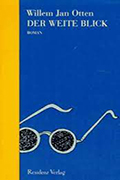
An ‘exciting’ (Brockschmidt, 1996) book, found Rolf Brockschmidt in Der Tagesspiegel. Willem Jan Otten befitted the ‘ambitious literary program’ (Residenz, 2021a) of the renowned publishing house Residenz. But the book, which was nominated for the prestigious AKO-literary award in the Netherlands in 1993, was not well received by everyone. A little too ‘laboured’ Martina Knoben judges Van Ottens debut novel in the Süddeutsche Zeitung (Knoben, 1996). According to her there is too much ‘visible framework’ and ‘to little substance’, a view that Werner Thuswaldner agreed with in the Salzburger Nachrichten. He too found it to be too ‘engineered’ (Thuswaldner, 1995).
Uns fehlt nichts
Otten’s second novel Uns fehlt nichts [We Lack Nothing] (1996) to some extent suffered a comparable fate. Uns fehlt nichts is the story of young doctor Justus who lets his antecessor, out of whose shadow he had not been able to step out of, die without intervening. This novel was found to be too harsh. In Der Standard Ingeborg Sperl questioned the severity and calvinistic values by which Otten judges and decides:
‘Adultery isn’t an amusing pass time, but a deep betrayal. Failure to assist someone might not be justiciable but murder all the same. The strange mixture of medical fiction and thriller – and the mild parody on both genres – shows us an author of great earnestness beyond the fun-society.’ (Sperl, 1996)
Apparently, people in the German-speaking world had the necessary perseverance for Otten’s essayistic fiction. In any case, Otten’s second book did not see a second edition in Austria either. The rights for both Der weite Blick as well as Uns fehlt nichts were sold to the publishing house Fischer, that published the translations in 1997 respectively 1999 as paperbacks.
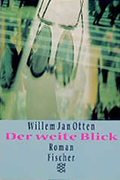
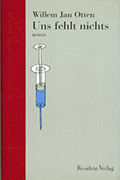
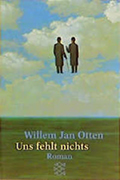
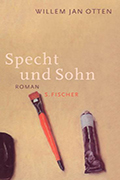
No guarantee for success
Willem Jan Otten is one of the most important authors of the Dutch-speaking world. In 2014 he was awarded the P.C. Hooft Award for his oeuvre, one of the most prestigious awards of the Netherlands. But the fact that one’s works are a part of the canon in one’s own country, moreover, that one belongs to the greats of the canon, is far from a guarantee for success abroad.
Even the translation of Otten’s novel Specht en zoon (2004) that was very successful in the Netherlands and had been distinguished with the grand Libris Literature Award in 2005, as Specht und Sohn in 2006 did not lead to the breakthrough of Willem Jan Otten in the German-speaking world. The book was almost immediately translated into German for Fischer by the famous translator Helga van Beuningen (see translations) but wasn’t a real success. Only three years after the first release a second softcover edition of Specht und Sohn was published by Fischer. New titles never followed.
Pferde sind auch Schweine
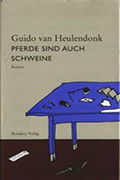
In 1998, two years after the book was awarded the ‘Gouden-Uil’ in Flanders and one year after the publication of the first and to date (2021) only English novel by Guido van Heulendonk (The Eve, 1997), Residenz published a translation of Van Heulendonks Paarden zijn ook varkens. The translation was done by Ulrike Vogl (Dutch department of the University of Vienna) and was lauded by Christian Holzmann as ‘congenial’ (Holzmann, 1999). Pferde sind auch Schweine tells the story of Eduard Bottelaer who is tasked by his lover Helena to collect objects from the city she left a task that at the end becomes an obsession.
The book is more than a ‘romance novel in artistic circles’, wrote the Frankfurter Allgemeine Zeitung (Poiss, 1999). Although the reviewer of the Viennese paper Der Falter did not find Pferde sind auch Schweine ‘funny’ at all (Quirchmair, 1999), Thomas Poiss from the Frankfurter Allgemeine contradicted by saying that the book impresses with ‘analytical wit’ and ‘rich, systematical detail’ (Poiss, 1999). Other critics agreed: ‘virtuosic and simultaneously laconic’ wrote Philipp Schmolke in Junge Welt (Schmolke, 1999), a book for ‘real literary gourmets’ found the reviewer in d’Letzeburger Land (m.r., 1999).
In the Salzburger Nachrichten Anthon Thuswalder announced that the ‘cheerful tragedy of an unlucky character’ by Van Heulendonk would be followed by more translations of his works (Thuswaldner, 1999), but apparently this also belonged to the realm of lost illusions of Eduard Bottelaer. Pferde sind auch Schweine is the only translated title by Guido van Heulendonk to have been published not only by Residenz but also in the German-speaking world.
A new beginning
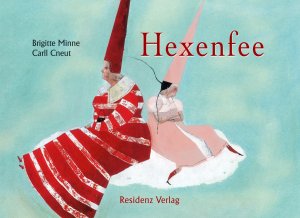
From 2003 on the wind of change swept through Residenz. During that time the publishing house decided to focus more on young German-speaking authors again and with regard to translations shifted towards central- and eastern-European authors.
The literature from the Netherlands and Flanders thus slipped under the radar for a while. This, however, did not apply for the new program for children’s and youth literature called Nilpferd that the director of Residenz Herbert Bitsche established in 2003. Within this framework Hexenfee a picture book by Brigitte Minne and Carl Cneut was published in 2017. Interestingly enough, the book was picked up by Bohem Press based in Münster ten years later and was retranslated by Ralf Erdorf, who had previously worked for Picus. (#Picus) Residenz’ children’s and youth literature program was very successful on the German-speaking market but despite that was sold to the Viennese publishing house G&G in 2015, that had become the biggest publisher of children’s and youth literature in Austria in the meantime. (Residenz, 2021b)
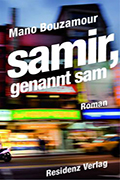
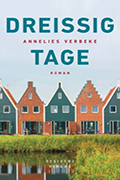
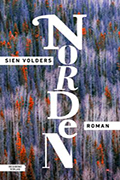

Only in 2016 did literature form the Netherlands and Flanders return to Residenz with the ‘Schwerpunkt Flandern & Niederlande’ [Focal Point Flanders & the Netherlands] at the Frankfurt Book Fair. (#Fairs) The bookseries opened with the translation of De belofte van Pisa by the bestselling author Mano Bouzamour entitled Samir, genannt Sam. From 2016 on Residenz continued to expand its program of translations with translations from the Dutch-speaking world. Two years after the publication of Samir, genannt Sam, Residenz published Dreißig Tage the publishing house’s first translation of a novel by Annelies Verbeke, who had had her debut in the German-speaking world with Reclam in 2005. Another two years later Residenz published Norden by Sien Volders, a story about a woman named Sarah who finds herself at a turning point in her life and decides to move to the north for a while in search of freedom.
Residenz continues to publish translations of Dutch literature, but in contrast to the 1990s the focus doesn’t lie on the presentation of an oeuvre anymore. Instead, accents are set with a different Dutch author every two years in a landscape that unfolds in the panorama view.
(Herbert Van Uffelen)
References
Brockschmidt, Rolf: Wenn Blinde zuviel sehen - Ein Roman rund ums Visuelle von Willem Jan Otten. In: Der Tagesspiegel, (7.1.1996).
Holzmann, Christian: Die aktuelle Rezension: Guido van Heulendonks 'Pferde sind auch Schweine'. In: GermanistInnen-Forum, Vol.: 14, (1999).
Knoben, Martina: Sehend so blind - Willem Jan Ottens Roman 'Der weite Blick'. In: Süddeutsche Zeitung, (7.3.1996).
m.r.: Von einem Genter Stadtneurotiker. In: d´Letzeburger Land, Vol.: 8, (18.2.1999)
Poiss, Thomas: Flämischer Prachtschinken - Ziemliches Schwein gehabt: Guido van Heulendonks Landleben. In: Frankfurter Allgemeine Zeitung, (31.5.1999).
Pralle, Uwe: Erzählung aus dem Zeitalter der verräterischen Bilder - Willem Jan Ottens kleines Meisterwerk 'Der weite Blick'. In: Frankfurter Rundschau, (19.10.1995).
Quirchmair, Erwin: Aufgeblättert. In: Der Falter, Vol.: 7, Wien, (17.21999)
Residenz Verlag (a): Über Uns (2021). https://www.residenzverlag.com/verlag/ber-uns [13.12.2021]
Residenz Verlag (b): Verlagsgeschichte (2021). https://www.residenzverlag.com/verlag/verlagsgeschichte [13.12.2021]
Schmolke, Philipp: Pferde und ihre Äpfel - Guido van Heulendonk entdeckt mit dem Roman Pferde sind auch Schweine bekannte und unbekannte Welten im Tier. In: Junge Welt, (1999).
Sperl, Ingeborg: Das Undenkbare geschehen lassen. In: Der Standard, (25.10.1996).
Thuswaldner, Anton: Der Kulturbetrieb als Satire. In: Salzburger Nachrichten, (25.1.1999).
Thuswaldner, Werner: Lauter Szenen wie im Film - 'Der weite Blick' von Willem Jan Otten. In: Salzburger Nachrichten, (29.07.1995).
